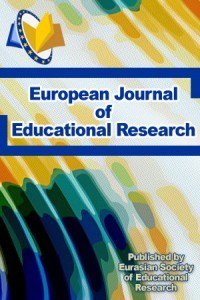Mindful Self-Care Scale (MSCS): Adaptation and Validation in a Normative Turkish Sample
Mindful Self-Care Scale (MSCS): Adaptation and Validation in a Normative Turkish Sample
Self-care, mindful self-care scale, mindfulness,
___
- Aydin Sunbul, Z. (2016). The relationship between mindfulness and resilience among adolescents: mediating role of self-compassion and difficulties in emotion regulation (Unpublished doctoral dissertation). Middle East Technical University, Department of Educational Sciences, Ankara.
- Bentler, M. (1990). Comparative fit indices in structural models. Psychological Bulletin, 107, 238-246.
- Braime, H. (2013). From coping to thriving: How to turn self-care into a way of life. England: Individuate Press.
- Brown, A. T. (2006). Confirmatory factor analysis for applied research (1st ed). New York: Guilford Press.
- Brown, K. W., West, A. M., Loverich, T. M., & Biegel, G. M. (2011). Assessing adolescent mindfulness: Validation of an adapted Mindful Attention Awareness Scale in adolescent normative and psychiatric populations. Psychological Assessment, 23, 1023-1033.
- Byrne, B. M. (2001). Structural equation modeling with AMOS: basic concepts, applications, and programming. NJ: Lawrence Erlbaum Associates.
- Cook-Cottone, C. P. (2015a). Incorporating positive body image into the treatment of eating disorders: A model for attunement and mindful self-care. Body Image, 14, 158–167.
- Cook-Cottone, C. P. (2015b). Mindfulness and yoga for self-regulation: A primer for mental health professionals. New York: Springer.
- Cook-Cottone, C. P., & Guyker, M. W. (2018). The development and validation of the Mindful Self-Care Scale (MSCS): An assessment of practices that support positive embodiment. Mindfulness, 9:1, 161-175.
- Dorociak, E. K. (2005). Development of the Personal and Professional Self-Care Scale. Master's Theses. Paper 3130.http://ecommons.luc.edu/luc_theses/3130.
- Fraenkel, J., Wallen, N., & Hyun, H. (2011). How to design and evaluate research in education (8th ed.). US: McGraw-Hill Education.
- Hambleton, R. K., & Bollwark, J. (1991) Adapting tests for use in different cultures: Technical issues and methods. Bulletin of the International Test Commission, 18, 3-32.
- IBM Corp. (2011). IBM SPSS Statistics for Windows. Version 20.0. Armonk. NY: IBM Corp.
- Kline, B. R. (2011). Principles and practice of structural equation modeling (3rd ed.). New York: Guilford Press.
- Linehan, M. M. (2015). DBT skills training handouts and worksheets (2nd ed.). New York: The Guilford Press.
- Riegel, B., Jaarsma, T., & Stromberg, A. (2012). A middle-range theory of self-care of chronic illness. Advances in Nursing Science, 35, 194–204.
- Salvucci, P. (2001). Self-care now! 30 tips to help you take care of yourself & minimize caregiver burnout. USA: Pauline Salvucci.
- Sidani, S., & Doran, D. (2010). Relationships between processes and outcomes of nurse practitioners in acute care: An exploration. Journal of Nursing Care Quality, 25(1), 31–38.
- Sousa, V. D., Zauszniewski, J. A., Bergquist-Beringer, S., Musil, C. M., Neese, J. B., & Jaber, A. F. (2010). Reliability validity and factor structure of the Appraisal of Self-Care Agency Scale - Revised (ASAS-R). Journal of Evaluation in Clinical Practice, 16, 1031–1040.
- Tabachnick. B. G., & Fidell, L. S. (2006). Using multivariate statistics (5th ed.). Boston: Allyn and Bacon.
- Tucker, L. R., & Lewis, C. (1973). The reliability coefficient for maximum likelihood factor analysis. Psychometrica, 38, 1-10.
- Weinger, K., Butler, H. A., Welch, G. W. & La Greca, A. M. (2005). Measuring diabetes self-care: a psychometric analysis of the Self-Care Inventory-Revised with adults. Diabetes Care; 28: 1346–52.
- Ziguras, C. (2004). Self-care: Embodiment, personal autonomy and the shaping of health consciousness. London: Routledge.
- ISSN: 2165-8714
- Başlangıç: 2012
- Yayıncı: Eurasian Society of Educational Research
Gender Gap in Science Achievement for Jordanian Students in PISA2015
Emad G. ABABNEH, Manal M. ABDEL SAMAD
Opinions of Social Studies Prospective Teachers on Out-of-School Learning
Meral METİN GOKSU, Tugba SOMEN
Mindful Self-Care Scale (MSCS): Adaptation and Validation in a Normative Turkish Sample
Zeynep AYDİN SUNBUL, Asude MALKOC, Meltem ASLAN GORDESLİ, Reyhan ARSLAN, Ferah CEKİCİ
Teachers’ Moral Intelligence: A Scale Adaptation into Turkish and Preliminary Evidence
Mustafa TOPRAK, Mehmet KARAKUS
Mustafa Serkan GUNBATAR, Halit KARALAR
The Mathematics Learning Styles of Vocational College Students
Investigating Childhood Fears during Preschool Period in terms of Child, Mother and Teacher Opinions
Alev ONDER, Gulsen ILCİ KUSMUS, Ozge CENGİZ
The Effect of Choral Participation on Middle School Students’ Life Satisfaction
Bagde YİLMAZ, Gulnihal GUL, Doruk ENGUR
A Qualitative Study on the Reasons for Social Media Addiction
